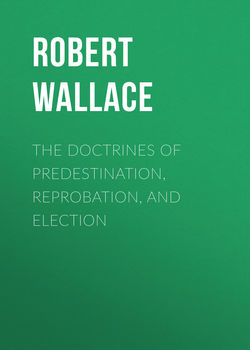Читать книгу The Doctrines of Predestination, Reprobation, and Election - Robert Wallace - Страница 7
PART I.—PREDESTINATION
CHAPTER IV.
PREDESTINATION CONSIDERED WITH REFERENCE TO DIVINE FOREKNOWLEDGE
ОглавлениеThe Foreknowledge of God is held as evidence that He has foreordained whatsoever comes to pass. He foreknows, so it is argued, but He does so because He has foreordained. Calvin says, “Since He (God) doth not otherwise foresee the things that shall come to pass than because He hath decreed that they should so come to pass, it is vain to move a controversy about foreknowledge, when it is certain that all things do happen rather by ordinance and commandment” (B. iii.) Toplady says “that God foreknows futurities, because by His predestination He hath rendered their futurition certain and inevitable.” Bonar says, “God foreknows everything that takes place, because he Has fixed it” (Truth and Error, p. 50). The same doctrine is held by the younger Hodge—that foreknowledge involves foreordination.
There have been some who have denied the infinitude of God’s knowledge, notably Dr. Adam Clarke. He held that God, although possessed of omnipotence, yet as He chooses not to do all things, so also although He possesses the power of knowing all things, yet He chooses to be ignorant of some things. In refuting this notion, Dr. Hodge remarks, “But this is to suppose that God wills not to be God, that the Infinite wills to be finite. Knowledge in God is not founded on His will, except so far as the knowledge of vision is concerned—i.e., His knowledge of His own purposes, or what He has decreed shall come to pass. If not founded on His will it cannot be limited by it. Infinite knowledge must know all things actual or possible” (Vol. I., p. 546). Although the motive underlying Clarke’s argument is good, yet it is not wise to sacrifice the Divine intelligence to the Divine goodness. God is the infinitely perfect one, but to suppose that He is ignorant of what will happen tomorrow is to limit His perfections, and make Him a dependent being. But neither can we accept the Calvinistic doctrine, that God foreknows because He has foreordained. This, properly speaking, is not foreknowledge, but after knowledge, since it comes after the decree. It is, moreover, simply assertion. It is not a self-evident proposition, and is neither backed by reason nor Scripture. The great difficulty, however, with our Calvinistic friends is regarding certainty. If God is certain that an event will happen, then, so it is argued, it must happen. If we deny that there is an absolute necessity for the event as an event happening, then it is replied that God in that case was not certain. But this is sophistical reasoning—slipshod philosophy. God was certain that the event would happen, but He was also certain that it need not have happened. The Divine knowledge is simply a state of the Divine intelligence, and never causes any thing. It comprehends all that is past, all that now is, and all that will ever be. But it comprises more than this, and herein lies the key of the mystery. It takes in the possible, or that which is never realised in the actual. Human knowledge does this—and how much more the Divine! God knows that the thief will steal; He is certain that he will do it, but He is also certain that he need not do it. His being certain that the theft will take place does not necessitate the theft. It (the certainty) exercises no controlling agency upon the wrong-doer. Dr. W. Cooke remarks, “What is involved in necessity? It is a resistless impulse exerted for a given end. What is freedom? It involves a self-determining power to will and to act. What is prescience? It is simply knowledge of an event before it happens. Such being, we conceive, a correct representation of the terms, we have to inquire, where lies the alleged incompatibility of prescience and freedom? Between freedom and necessity there is, we admit, an absolute and irreconcilable discrepancy and opposition; for the assertion of the one is a direct negation of the other. What is free cannot be necessitated, and what is necessitated cannot be free. But prescience
